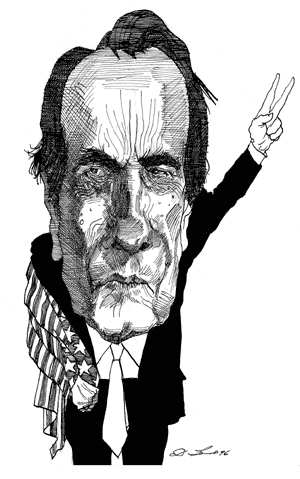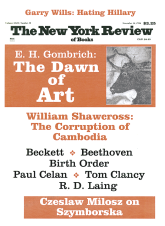A foreigner observing this year’s presidential campaign could be forgiven for coming away with the idea that American political history since 1960 has consisted largely of a series of changes in the tax rate. A list of highlights, drawn from the presidential and vice-presidential debates, would look something like this.
1964: Congress passes Kennedy tax cut; 1965: Bob Dole votes against Medicare; mid-to-late 1960s: socialism comes to the inner cities (which had been doing just fine under capitalism) via public housing, public schools, and welfare, which pays people for doing what liberals tell them to do; 1970s: in an otherwise uneventful decade, Dole blames the Democrats for starting World War II; 1980s: the largest tax increase in the history of the world is voted for by Senator Edward M. Kennedy, the deficit triples, and crime and drug use soar in the tiny state of Arkansas, which maintains the second-lowest tax burden in America; 1991: Colin Powell (Norman Schwarzkopf is also involved) leads American troops, who are the finest, best-trained, and best-equipped men and women in the history of the planet, to victory in the Persian Gulf.
1993: Bill Clinton signs the largest tax increase in the history of the world, which lowers taxes on nine million working families; 1994-1996: the United States causes a fiscal crisis in Mexico, lends that country billions of dollars, and makes a $100 million profit, which is used to reduce the deficit; 1995: Newt Gingrich shuts down the federal government in an effort to cut Medicare payments to our seniors; 1996: the no-fly zone is extended to the suburbs of Baghdad, making Saddam Hussein better off than he was four years ago; 1993-1996: ten and a half million new jobs are created, but half these people are working just to pay income taxes and would rather not work at all unless they felt like it, which is what America is all about.
As for the future, we will see either one huge tax cut disproportionately favoring the wealthy, raising taxes on twelve million working Americans, and blowing a hole in the deficit while bringing free enterprise to the inner cities and civility to baseball (if Dole and Kemp are elected), or else a lot of tiny designer tax cuts providing the tools people need to make the most of their lives and also bringing civility to baseball (if the President is re-elected and we can trust anything the guy says).
There seem to be a few holes in this cheese. It is the aim of political campaigns, of course, to put them there—to string together just those bits of history that lead to the moral that is the candidate’s platform. And by the nature of campaign give-and-take, both sides usually end up running on more or less the same narrow issue, spinning each historical “fact” as it suits them. In 1988 the issue was patriotism; in 1992 it was gridlock; in 1996 it is taxes. Once the issue is established, it is almost impossible to change it, and the election begins to tilt irreversibly in one direction. Once patriotism was established as the issue in 1988, Dukakis was finished, for he had no way of making himself look like a patriotic hero. And once gridlock was established as the issue in 1992, Bush was finished, since he represented the status quo and Clinton and Perot were the “change agents.”
This year, making taxes the theme would seem to have given the tilt to Dole. It was Dole, after all, who picked it. And though he has tried to replace it with “character,” his campaign had worked so hard to make everything else seem secondary to tax policy that he has been almost powerless to switch. He didn’t help himself by allowing Clinton, in the first debate, to boast that “You can probably tell we like each other,” an assertion to which no effective riposte is possible, and which draws the teeth from most subsequent personal attacks. If Dole and Clinton really are friendly, swapping in the White House (as Dole confided in the first debate) heartfelt stories about their mothers, then outrage on Dole’s part about Clinton’s sleaziness is going to look a little opportunistic. Dole clearly set out to make himself more likeable in the first debate, and this was the wrong ground to choose, since he cannot win a likability contest with Clinton. And of course he was subsequently pinned on the subject by his exuberant running mate, who explained that an attack on someone’s character would be beneath Bob Dole. In the days of discouragement following Kemp’s performance the Dole campaign succeeded in making an issue not of Clinton’s character but of whether Clinton’s character should be an issue—which is exactly what the Clinton campaign would like the issue to be.
But why haven’t taxes worked? One reason is that it was never Dole’s theme. It was Kemp’s. Character, in fact, is Dole’s natural narrative (though he needs someone else to help him tell it). Dole’s own record, as Gore made clear (was there anything Gore said that he did not make clear?), is not the record of a tax cutter. Until last summer, Dole was an anti-supply-side deficit hawk. He doesn’t know the supply-side language, he doesn’t believe in voodoo economics, and he has no particular record as a tax cutter to call upon. He is afloat on a strange sea with a man he has never liked and who won’t shut up.
Advertisement
What’s worse, though, is that cutting taxes is the very issue which makes it impossible for Dole to utter the magic name of Reagan. Reagan is the biggest hole in this year’s cheese. Almost no one has mentioned him since the Republican convention in August; his name was not uttered once (apart from a couple of references to the Reagan and Bush administrations) in the course of the three debates. Clinton can’t mention Reagan, of course, because of Reagan’s personal popularity. He has to describe the economic accomplishments during his own tenure—job growth, small but measurable wage increases, and lower deficits—as though no one was responsible for the problems they alleviate. But Dole can’t mention Reagan either, because he has borrowed from Reagan the one issue on which he has always been a skeptic—the belief that tax cuts will lead to a balanced budget.
Still, Dole may not believe it, but Kemp certainly believes it, the Republicans who voted for Steve Forbes believe it, and so presumably do many of the people who elected a Republican Congress in 1994. If any campaign could bring this anti-tax, anti-government platform into the mainstream, it would seem to be a Dole campaign. But the platform has achieved no credibility, and the reason is that it has fallen below the threshold of media legitimacy.
It is an extremely low threshold. The press is committed—properly, though sometimes with weird effects—to neutrality on matters of policy. They confine themselves to matters of presentation, which they chew over and reduce to a single piece of consensual wisdom with astonishing speed. After the first presidential debate, it took about twenty-four hours for the media assessments to shake themselves out. The response by the television press immediately after the debate was that Dole had beaten expectations, come across as funny and human, and achieved something better than a draw. The response the next morning in the newspapers was that Dole had been barbed and aggressive. The consensus was that Dole had not succeeded in taming his habitual tartness, but had failed to help himself by passing up a series of opportunities to attack Clinton.
The consensus on the vice-presidential debate took about two minutes. There was some interest among commentators on PBS—notably Haynes Johnson and William Kristol—in the way Kemp had sounded like a liberal Democrat and Gore like a moderate Republican. But the general conclusion was that Kemp was underprepared and inarticulate, and that Gore had skillfully parried every thrust and emerged the clear winner. These judgments are entirely based on style points, though, because style is a matter it has been granted to the commentators in the press and television to judge. A position may be wrong-headed, but the candidate cannot be marked down for that. He must be marked down for failing to connect with the American public, for speaking in jargon or abstractions, for repeating himself, or for looking at his watch.
Positions on the issues can be brought into the equation only when they are sufficiently disreputable for the press to feel professionally comfortable about criticizing them, and the Dole-Kemp 15 percent tax cut has to a large extent fallen into this category. (The current distribution of wealth is an example of an issue that has not.) Television journalists in particular have no hesitation about accompanying mentions of an across-the-board tax cut with a raised eyebrow over deficits, entitlements, interest rates, and so on. The cut is a discredited position among reporters; they all remember David Stockman. And since so few positions are discredited at that level, it is a political dead duck. Dole might as well be running on the claim that he can move the Dodgers back to Brooklyn.
The press has been ambivalent about the legitimacy of using Clinton’s personal character as an issue. Journalists love, especially in such a torpid campaign, to see it raised, but they’re very clear that Dole is the one raising it, not the press. On the other hand, what Dole, in the strong speech he delivered on the eve of the second presidential debate, called “public ethics”—the various political scandals that have been a constant feature of the Clinton administration—did appear to cross the threshold of media acceptance. So, emboldened by the coverage, he put the tomato in his pocket, and when the moment arose in the debate’s first question, he shut his eyes and flung it at the barn. But when he opened them again, the barn must have moved, because there was Clinton purring away about diversity as though Dole had never uttered a word.
Advertisement
It was an unnerving moment, and Dole’s aim did not improve the two or three more times he tried. Part of his problem, as Howard Fineman of Newsweek noted after the debate, was that Dole is still in a senatorial mode: he’s in the habit of just dropping a shorthand phrase—“Indonesia,” for example—to get the subject “on the record,” with the understanding that his remarks can then be amended by some staff person later on. Dole presented his own character in its most appealing light in the final debate, but as for the rest, his heart was plainly not in it. Thirty-five minutes went by before he even mentioned the tax cut. And when, with ten minutes to go, a minister asked him a direct question about ethics, his first response was to talk about the Tenth Amendment. It is a strange corner for a man supposed to have been a master of legislation to have painted himself into.
The commentary was split in the same way it had been for the first debate: television emphasized the gentility and the newspapers emphasized the aggressiveness. Aggressiveness makes better headlines, but there is a gender gap in the media itself. Apart from Crossfire-style shows for political junkies, much of television is about the importance of being nice. The producers seem concerned to appeal to women. Last summer’s Olympics coverage was stupefyingly nice, with an express purpose of attracting female viewers, and it scored record ratings. The sports pages of American newspapers, which are read by men, are distinctly not nice. (It is typical of Dole’s luck that the Fox network chose to broadcast an important and exciting baseball game in the same time slot as the final debate.) Clinton is the master of nice. Television is his medium. Bob Dole’s medium, it turns out, is the Congressional Record.
—October 17, 1996
This Issue
November 14, 1996




